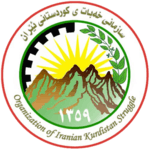Organization of Iranian Kurdistan Struggle
The Organization of the Iranian Kurdistan Struggle (Kurdish: سازمانى خهباتى كوردستانى ئێران, Persian: سازمان خبات انقلابی کردستان ایران), usually called Khebat (Kurdish for "struggle"), is an armed ethnic party of Kurds in Iran, currently exiled in northern Iraq.
Khebat | |
|---|---|
 | |
| Leader | Babeshekh Hosseini |
| Founder | Jalal Hosseini |
| Founded | 21 June 1980 |
| |
The group maintains close ties to the People's Mujahedin of Iran, and is responsible for cross-border attacks against Iranian forces.[1]
History
The group was founded on 21 June 1980, as the 'Organization of National and Islamic Struggle' by associates of Ezaddin Hosseini, with his brother Jalal Hosseini being their lead figure.[2] It split in 1987, when the current leadership accused its opponents of being the agents of Iranian regime.[2] In 2006, the group renamed itself to the current name under leadership of Babeshekh Hosseini, son of Jalal Hosseini.[2]
Main approach
- The Organization of Iranian Kurdistan Struggle is national force, upon believes in freedom, extend and elaborate its national struggle to obtain its rights and freedom of Kurdish people.
- The Organization of Iranian Kurdistan Struggle fights for rescuing Kurds, providing freedom, collapsing Mullahs regime and establishing an elected democratic government in Iran, and providing the rights of Kurdish people.
ch
- The Organization of Iranian Kurdistan Struggle is national force, upon believes in freedom, extend
and elaborate its national struggle to obtain its rights and freedom of Kurdish people.
d. The Organization of Iranian Kurdistan Struggle fights for rescuing Kurds, providing freedom,
collapsing Mullahs regime and establishing an elected democratic government in Iran, and
providing the
References
- "Manuevers inside Kurdish movements", FDI's Weekly Newswire (35), 3 February 1997
- Ahmadzadeh, Hashem; Stansfield, Gareth (2010), "The Political, Cultural, and Military Re-Awakening of the Kurdish Nationalist Movement in Iran", Middle East Journal, 64 (1): 11–27, JSTOR 20622980